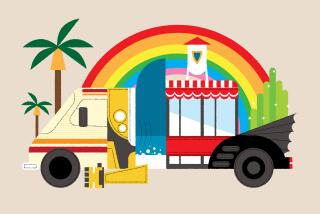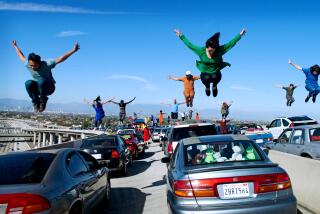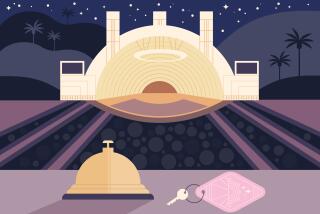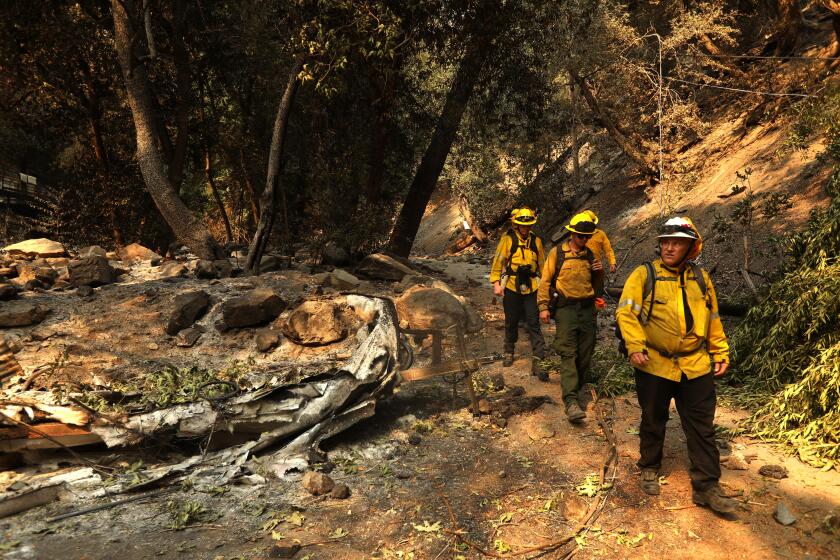Southern California Close-Ups: Going Hollywood
Pity the rubes. Those wayward tourists who dawdle in their cars and tour buses along Beachwood Drive, enraging the locals as they haltingly seek that perfect Hollywood sign photo op — they know not what they do. Maybe you’re not from this neighborhood either, but you have savvier Hollywood plans.
They involve horse trails, hidden hotels, a magic castle, a monastery — and that’s just a start. To close out our yearlong series of Southern California Close-Ups, here is a set of 10 Hollywood micro-itineraries, suitable for visitors from across town or across the planet. To see the previous 11 installments in our multimedia tour of Los Angeles and Orange counties, go to latimes.com/socalcloseups.
1. Get thee to a nunnery
 The Hollywood sign (Jay L. Clendenin / Los Angeles Times)
The Hollywood sign (Jay L. Clendenin / Los Angeles Times)
More specifically, head for the Monastery of the Angels (1977 Carmen Ave., a mile from the Hollywood sign), where 17 cloistered nuns spend their days praying, eating, sleeping and making desserts. Hand $10 to the gift-shop volunteer for a hefty loaf of pumpkin bread — a fine souvenir, if it lasts that long. Then head two blocks east to Beachwood Drive, turn north toward the famous sign and keep going even after the road dwindles to dirt. There you’ll find Sunset Ranch (3400 Beachwood Drive), where horses can be rented for guided rides (ages 8 and older). For $30 you get an hour. Start about 4 p.m. on a clear winter day and you’ll get a different angle of the Hollywood sign, but better still, a Technicolor panorama with setting sun, a distant sliver of the Pacific, city lights at your feet and a whiff of horse manure to keep it real. The ranch is also the starting point for the Hollyridge Trail hike, which takes you near the fenced-off Hollywood sign, or you can explore the half-dozen public staircases threaded among the hillside homes. (Plot your route at https://www.beachwoodcanyon.org/Stairs.htm or buy Charles Fleming’s 2010 paperback “Secret Stairs: A Walking Guide to the Historic Staircases of Los Angeles.” And in the interest of full disclosure: Fleming is an L.A. Times editor.) When you’re done, you’ll want a thick slice of that pumpkin bread and maybe a nap in your room at the handy Best Western Plus Hollywood Hills Hotel (6141 Franklin Ave.). The hotel is a mid-range, retro-mod affair with signed glossies of Ray Charles and Marty Feldman on the lobby wall; the movie “Swingers” was written in the lobby-adjacent 101 Coffee Shop.
2. The Bowl, the Greek, the difference
 The Hollywood Bowl (Robyn Beck / AFP / Getty Images)
The Hollywood Bowl (Robyn Beck / AFP / Getty Images)
The Hollywood Bowl (2301 N. Highland Ave.) is such a prime city asset that it’s a wonder nobody has proposed selling it to reduce municipal debt. It was carved into the hills in the 1920s and programmed by the L.A. Philharmonic, seats about 17,000 people and stages mostly jazz, classical works and show-tune performances, June through September. For newbies, the big surprise is that by long tradition, audiences can bring their own picnics, beer and wine. The city’s other prime summer pop-concert option, the Greek Theatre, four miles east at 2700 Vermont Ave., is more intimate, with room for just 5,800 and a season that runs from late April through late October. The Greek will not let you bring in your own food or drink.
3. Hip strip
 Oaks Gourmet Market (Elina Shatkin)
Oaks Gourmet Market (Elina Shatkin)
You’re not in a hurry. So you patiently seek one of the rare parking spots off Franklin Avenue near Tamarind Avenue, then meander past the trendy row of shops and restaurants between Tamarind and Bronson avenues. Browse Counterpoint Records & Books (5911 Franklin Ave.), scan magazines at the Daily Planet (59311/2 Franklin Ave.). The casual Victor’s restaurant (1917 N. Bronson Ave.) will seat you beneath old photos of the hills. The Oaks Gourmet Market (1915 N. Bronson Ave.) will sell you fancy wines and beers, make you a lunch to take away or feed you at the shop’s one communal table.
4. Musso, Frank, Pantages, Frolic and Redbury
 Pantages Theatre (Jay L. Clendenin / Los Angeles Times)
Pantages Theatre (Jay L. Clendenin / Los Angeles Times)
Wouldn’t that be a great name for an L.A. law firm? Sit down to an early dinner at Musso & Frank Grill (6667 Hollywood Blvd.), the oldest restaurant in Hollywood (opened 1919), for old-world service, setting and menu, with juicy steaks and the option of Jell-O for dessert. Then nip out back for a high-end cocktail ($14) at the Writer’s Room (6685 Hollywood Blvd.), which feels pre-Elvis but opened next door a couple months ago. Now you’re ready for a show at the Pantages Theatre (6233 Hollywood Blvd.), whose 1930 Art Deco lobby is one of the greatest rooms in the city. On your way out after the show, admire the vintage sign announcing the Frolic Room (6245 Hollywood Blvd.). You’ll sleep around the corner at the Redbury Hotel (1717 Vine St.), whose 57 rooms are about twice the size of those at the glitzy W Hotel (6250 Hollywood Blvd.) and sometimes more affordable. The Redbury has no pool, but every room has a washer, dryer and turntable. It’s where the cool kids might come after having kids of their own. As for the W, it’s for those who can’t resist a slice o’ Vegas — a party hotel where scene-makers rage into the wee hours at Drai’s nightclub next to the rooftop pool.
5. A movie? Or a live show about movies?
 Hollywood & Highland complex (Wally Skalij / Los Angeles Times)
Hollywood & Highland complex (Wally Skalij / Los Angeles Times)
If you can handle $56 a person and up, there’s no better place than Hollywood to see a sort-of play about movies — Cirque du Soleil’s “Iris,” which shares the Kodak Theatre (6801 Hollywood Blvd.) with the annual Oscars ceremony. “Iris,” which premiered in mid-2011, is a mix of gymnastics, dancing, live music, cinematic effects and trapeze work, held together by a slender plot. It’s expected to run for years. Even if your mind starts wandering after intermission, the evening is a great showcase for performers with stupendous skills. Because the theater is enveloped by the Hollywood & Highland mall, you can check the shops and its ridiculous highflying concrete elephants (inspired by D.W. Griffith’s movie sets). But wait. If you have kids younger than 8 or so — or a tighter budget — skip the Kodak. Cross the street and see a movie in Disney’s exuberantly restored El Capitan Theatre (6838 Hollywood Blvd). This venue, built in 1926, premiered “Citizen Kane” in 1941 and kicked off Hollywood’s revival with its reopening 50 years later. If you’re a screen history geek or in a celebratory mood, you might like the Spanish-style Roosevelt Hotel (7000 Hollywood Blvd.), where the first Academy Awards were held in 1929, where Shirley Temple is said to have danced with Bill “Bojangles” Robinson on the lobby steps, and where there are several busy bars and restaurants, including the well-regarded burger joint Twenty-Five Degrees, which stays open all night. It can get loud on weekends, and recent renovations have unaccountably mixed Asian minimalism with the old Spanish flourishes. The Renaissance Hollywood Hotel (1755 N. Highland Ave.), comparably priced, twice the size, only 10 years old and right next to Hollywood & Highland, will suit some travelers better.
6. Concrete handprints, terrazzo stars and the boulevard
 The Hollywood Walk of Fame (Wally Skalij / Los Angeles Times)
The Hollywood Walk of Fame (Wally Skalij / Los Angeles Times)
Don’t worry about the Hollywood Walk of Fame — you’ll cover it in the course of meandering among other sites. But for the record, its 2,400-plus terrazzo stars, the first of which were laid in 1960, now cover 15 blocks of Hollywood Boulevard and a few neighboring streets too. To see who’s where, check projects.latimes.com/hollywood/star-walk. As for the emblematic Grauman’s Chinese Theatre (6925 Hollywood Blvd.), by all means browse the names and handprints, but be careful with your camera. Celebrity impersonators swarm here, some charming, some not, and they’ll be quick to ask for a dollar tip if you snap a picture that includes them. You’ll see that Starline Tours, the 800-pound gorilla of the Hollywood and homes-of-the-stars bus tour business, has a kiosk in front of Grauman’s. Maybe you can’t bring yourself to do such a tourist thing yourself, but maybe you have a friend. Send that friend on a Monday or Tuesday to catch the hourlong double-decker bus tour with guide Brian Donnelly, who has quick wit, good facts and a lot of them. (Donnelly also works for Dearly Departed Tours, specializing in crime scenes and celebrity graves.) Elsewhere on Hollywood Boulevard, brace yourself for residual squalor, T-shirt emporiums, vendors of cheap suits, and enough trashy lingerie shops to outfit all the ex-wives of Hugh Hefner and Charlie Sheen. You’ll surely come across industrial-size tourist attractions Tussauds, Ripley and Guinness (all within five blocks of Hollywood & Highland). It’s a relief to spot an independent such as the Larry Edmunds Bookshop (6644 Hollywood Blvd.), where the proprietor keeps about 1,000 old movie posters behind the counter, folded and filed in ancient manila folders.
7. Stars at work, stars at rest
 Paramount Pictures (Ricardo DeAratanha / Los Angeles Times)
Paramount Pictures (Ricardo DeAratanha / Los Angeles Times)
Like Universal and Warner Bros. studios in the San Fernando Valley and Sony in Culver City, Paramount Pictures (5555 Melrose Ave.) opens its lot to paying visitors, offering a two-hour guided weekday tour ($45 a person) by foot and golf cart. The Warner Bros. tour is best at giving outsiders a sense of working Hollywood, including glimpses of prop inventories and sound-effects tools. But Paramount is where “Glee” is shot, where Fred Astaire and Ginger Rogers made musicals (Stage 29), where “Citizen Kane” and “Rear Window” were shot (Stages 19 and 18, respectively), where Kelsey Grammer spent 20 years on the sets of “Cheers” and “Frasier” (Stage 25, 1984-2004). Your guide will pull out a tablet computer to show movie and TV scenes shot on the premises, and you’ll probably get a peek at sets from some current shows. Note that studio rules forbid proposing marriage to anyone in the cast of “Glee” — “which has happened. Awkward,” says guide Brynn Kushner. After the tour, drive slightly east, stroll prosperous, pedestrian-friendly Larchmont Village and have a great ham sandwich at Larchmont Bungalow (107 N. Larchmont Blvd.). Then hop in the car again, head up to Santa Monica Boulevard and turn south into Hollywood Forever (6000 Santa Monica Blvd.), where you’ll find Rudolph Valentino, Douglas Fairbanks, Douglas Fairbanks Jr., Ramones guitarist Johnny Ramone, actresses Hattie McDaniel and Fay Wray and many others. In 2011, the cemetery added a memorial to Toto — the dog, not the rock band. Unlike Forest Lawn and others, Hollywood Forever eagerly offers maps to celebrity graves and hosts parties and DJs. From mid-May through mid-September, there are outdoor movie screenings (www.cinespia.org), where you can recline “above and below the stars.”
8. The reappearing club, the hidden hotel, the wayward pagoda
 The Magic Castle (Gary Friedman / Los Angeles Times)
The Magic Castle (Gary Friedman / Los Angeles Times)
The bad news: You probably aren’t among the 5,000 worldwide members of the Academy for Magical Arts. The good news: You can still get into its clubhouse, the Magic Castle (7001 Franklin Ave.). It’s a 1908 Victorian mansion a few blocks north of Hollywood Boulevard. Since 1963, the castle has served dinners and brunches to members and guests, who enjoy the magicians who work the castle’s intimate rooms — usually nine performers a night in three rooms — flashing cards, reading minds, creating illusions. Though a fire in October closed the club briefly, the adjoining annex soon reopened Wednesdays through Sundays, and management is hoping for a full reopening in January or February. If you don’t know a member, you can buy a 30-day membership ($100). Or — attention, please — you can book a room at the neighboring Magic Castle Hotel (7025 Franklin Ave.). In fact, this low-profile, 30-room hotel (a converted apartment building with a central pool) would be a great value even without access to the castle — low rates, pleasant grounds, sky-high TripAdvisor scores. Check in, take a swim, don the tie and jacket or little black dress (the castle has a formal dress code) and catch the hotel’s free shuttle to the clubhouse. There you’ll step into a world where secret doorways lead to shadowy bars, where Cary Grant and Johnny Carson once were insiders and Neil Patrick Harris sits on the board of directors. When the last trick is done, catch that shuttle again and close out the night with a $12 martini at neighboring Yamashiro (1999 N. Sycamore Ave.), a restaurant and bar that features a 600-year-old Japanese pagoda and wide, twinkling views of the inexhaustible city.
9. Adventures in East Hollywood
 Jumbo’s Clown Room (Jay L. Clendenin / Los Angeles Times)
Jumbo’s Clown Room (Jay L. Clendenin / Los Angeles Times)
For years, Palm’s Thai restaurant (5900 Hollywood Blvd.) has had a not-so-secret weapon: Kavee Thongpreecha, better known as Thai Elvis, who serenaded diners with the King’s hits while they dug into boar, deep-fried frog, fish maw salad and more conventional Thai dishes. Lately, Thai Elvis has been sidelined by poor health, but Palm’s Thai is still an emblematic L.A. experience. Because it’s in eastern Hollywood (where Thai Town and Little Armenia rub shoulders), odds are that a young Armenian valet will take your car as a Thai hostess welcomes you. While diners fill the long line of tables in the big, airy dining room, pop performers typically do half-hour sets at 7:30, 9 and 10 p.m. daily. But you may move on sooner. Drawing on the many aspiring actors in town, the Hudson Theatres (6539 Santa Monica Blvd.) and several other venues have grown to make up a Hollywood Theater Row along Santa Monica between La Brea Boulevard and El Centro Street. Most have 99 or fewer seats and ticket prices less than $30. The work can be outstanding, and that ought to be enough to fill your night. But some people want an edgier, only-in-L.A. sort of adventure. For them, there’s Jumbo’s Clown Room (5153 Hollywood Blvd.), a smallish, strip-mall, retro-burlesque joint that features pole-dancers who keep on their bikinis and whose ages and shapes vary considerably. Two matronly women pour the drinks. The bouncer looks like just another 163-pound unproduced screenwriter, and sometimes the drinkers are so happy chatting that the dancers seem an afterthought. What does it all mean? This much is sure: There’s no cover charge, tipping is encouraged and there’s a two-drink minimum.
10. In praise of bricks, mortar, music and soul food
 Amoeba Music (Ricardo DeAratanha / Los Angeles Times)
Amoeba Music (Ricardo DeAratanha / Los Angeles Times)
Start by scavenging for new and used music and videos in cavernous Amoeba Music (6400 Sunset Blvd.). Cross Sunset to Space 15 Twenty (1520 N. Cahuenga Blvd.), a little alt-mall that includes Umami Burger and Hennessey & Ingalls bookstore, which specializes in art and design volumes. For fortification, head to Stout (1544 N. Cahuenga Blvd.), which specializes in burgers and has more than 20 beers on tap. Then drive to the Guitar Center (7425 Sunset Blvd.). If you’re a musician, peruse the vast collection of instruments inside. If not, scrutinize the sidewalk in front, where Guitar Center has established a Rock Walk with handprints from more than 400 rock stars and others since 1985. You’ll notice several other music shops on the block, along with Aroma Café (7373 W. Sunset Blvd.), a good place for a bite. Later you’ll catch live music somewhere — maybe the tiny Hotel Café (a club at 1623½ N. Cahuenga Blvd.) — and on the way, you’ll cruise past the Highland Gardens Hotel (7047 Franklin Ave.), where in October 1970 Janis Joplin died of a heroin overdose in room 105. Eventually, it will be 3 a.m. on a Saturday or Sunday, and you or someone you love will suddenly feel the need for chicken and waffles. No problem. This is why Roscoe’s House of Chicken & Waffles (1514 N. Gower St.) stays open until 4 a.m. on weekdays. It’s not healthy, but hey, it’s not heroin. Eat heavy, sleep deep.
More to Read
Sign up for The Wild
We’ll help you find the best places to hike, bike and run, as well as the perfect silent spots for meditation and yoga.
You may occasionally receive promotional content from the Los Angeles Times.







